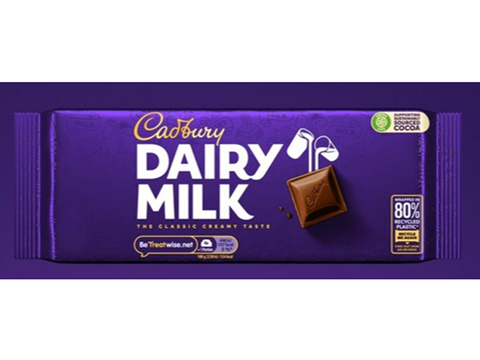
Mondelēz International has teamed up with Amcor and Jindal Films to wrap approximately 300 million Cadbury sharing bars in the UK & Ireland in 80% recycled plastic, apparently sourced from advanced recycling technology.
Starting from 2025 in a phased approach, the project aims to cover approximately 300 million sharing bars across the UK & Ireland Cadbury core tablet portfolio. Mondelēz says this is based on forecasted 2026 sales volumes, excluding non-certified wrappers and considering the use of mass balance material.
The move is expected to see the highest percentage of recycled flexible plastic used within the Cadbury brand globally, with 80% of the plastic used in the packaging attributed to recycled plastic through mass balance and ISCC PLUS certification. Amcor states that its AmFiniti solution converts post-consumer plastic waste into new product to provide Mondelēz with a packaging solution made using 80% certified recycled plastic, through a process which uses advanced recycling material (ARM) that is suitable for food-grade applications.
According to Mondelēz, consumers will be able to access a new platform via an on pack QR code to find out more about the Cadbury brand’s sustainable packaging journey and a ‘consumer-friendly’ explanation about mass balance. The platform will also feature the Recycle Now locator from WRAP, enabling consumers to check local collection and recycling points for a range of packaging materials.
Helen Bird, head of Material System Transformation at WRAP, comments: “The biggest recycling challenge is plastic wrapping - collecting it at scale, sorting and recycling it into new things - ideally packaging. Recycling this type of plastic back into food packaging can only be achieved through advanced recycling technologies.
“WRAP is delighted to hear that UK Plastics Pact member Mondelēz is rolling out the use of certified recycled plastic in its Cadbury sharing bars. This is the future and must be scaled far and wide across other companies and product ranges.”
In February, Cadbury Australia signed a deal with Amcor to source around 1000 tonnes of post-consumer recycled plastic to wrap approximately 500 million of its family-sized Dairy Milk chocolate blocks. Aiming to reduce its reliance on virgin plastics, the company intended to use around 50% recycled plastics for its Australian blocks, bars, and pieces.
A few months later, Saica Group and Mondelēz joined forces to launch paper-based packaging designed to be recyclable in the paper waste stream, targeting multipack products for the confectionery, biscuits and chocolate markets. The product is said to be suitable for the heat sealable packing process and can be produced coated or uncoated.
If you liked this story, you might also enjoy:
The ultimate guide to the Packaging and Packaging Waste Regulation in 2024
How are the top brands progressing on packaging sustainability?
Sustainable Innovation Report 2024: Current trends and future priorities
Everything you need to know about global plastic sustainability regulation














No comments yet